Can Graco Car Seats Be Used on Airplanes
This post contains affiliate links. As an Amazon Associate I earn from qualifying purchases.
Are you considering flying with a car seat? Or maybe you've decided it's your best option and wondering exactly how to fly with a car seat? Then you've come to the right place! This guide covers everything you need to know about travel with a car seat on planes – from airline rules to installation quirks to insider tricks you can only learn with lots of experience. We're sharing it all to make traveling with a car seat on a plane a smooth experience for your family.
Flying with a car seat is the safest option
Let's start with the most basic question: why should you fly with a car seat? The simple answer is that airplane seatbelts aren't designed for tiny bodies. The general recommendation is for children under 40lbs to fly in an FAA-approved restraint – either a travel car seat or a CARES harness (minimum weight 22lbs, but fits better at 30lbs – full review here). The best car seat for airplane travel depends on your child's age, size and development level – start your search here to pick the right one. The FAA and the NTSB both recommend using your car seat on airplanes.
This video shows you exactly why:
Why aren't parents required to use car seats on airplanes? First, because airlines have lobbied to prevent rules that might decrease the number of families who fly – and thus, their revenue. Second, air travel is much safer than car travel. Government statisticians have determined that society is better off overall with unrestrained or improperly restrained kids on flights than with many more families taking to the roads to travel. Learn more about the pros and cons of flying with a lap infant if you have a baby.
Even if you're reading this after you've made your travel arrangements and you didn't buy a seat for your baby, you can always ask at the ticket counter or check in with the gate agent. If the flight isn't full, you can often use an empty seat for free to put your child (with their car seat) so that everyone on the flight is safer.
So do you need to bring a car seat when traveling? You need some way to keep your child safe in-flight and safe on the roads beyond, so in part it will depend on your child's age and the type of trip.
Want to know all my best secrets? Click here to learn how to travel with your car seat like a pro!
Can you take a car seat on a plane? It depends on the airline

The US leads the way for using car seats on airplanes. Kind of shocking, eh? Not only do the FAA and NTSB encourage buying kids a seat and using a car seat in flight, but your right to use an FAA-approved car seat through the entire flight is protected by law. Bookmark these FAA rules on car seats on your phone (or even save it) in case a flight attendant gives you a hard time. Across the border, Transport Canada maintains similar standards.
If you bring your car seat on board (and you should), you'll have to use it for your child for take-off, landing and when the seatbelt sign is on during turbulent patches. All in the name of safety! Just make sure your car seat is certified for airplane use – nearly every car seat in the US is FAA-approved (just not this one). You can't use a booster seat on planes at all since they require a lap-shoulder seat belt, but a combination car seat like this one is completely fine if the harness is still installed. Get more details on bringing your booster seat on an airplane here.
Read more: Important info for traveling with car seats
How do I know if I have an airline approved car seat? Near the base of the car seat there's a white sticker with lots of small print. In red letters it should say that it's approved for aircraft use.
Below is an example of the FAA approved car seat sticker from this seat. It's located inconveniently on the bottom of the seat, but they're in different places on different seats. Make sure you locate yours before you get to the airport; for some international flights, we've had to show it at the check-in counter to avoid sending it along with the baggage. In other cases, we've been asked to show it before installing on the plane.
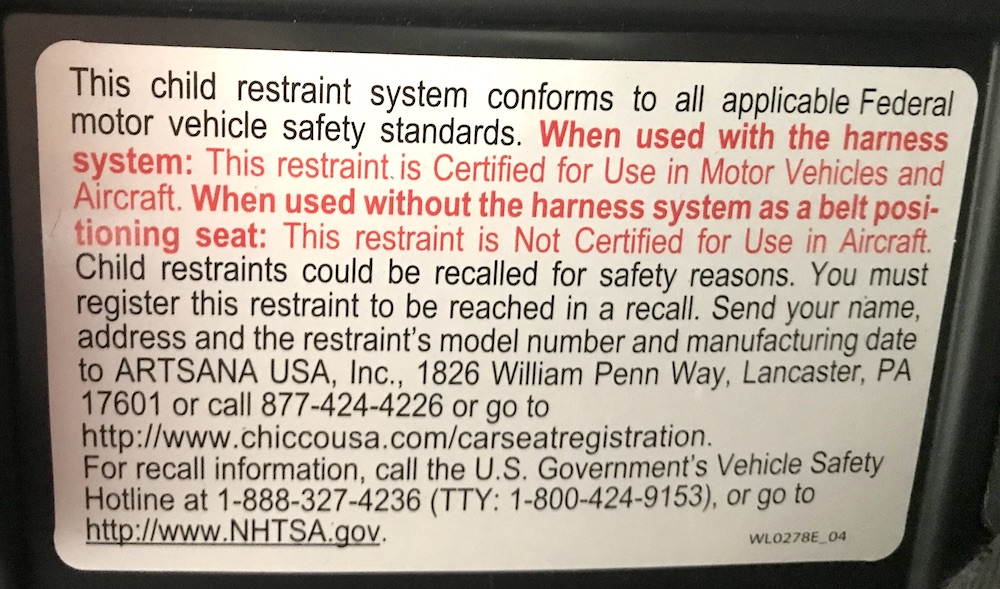
Some parents (and flight crews!) get confused when they see this because it has two separate sentences about aircraft. That's because the seat can either function as a forward-facing harnessed seat or as a booster seat. Just leave the harness in and you'll be fine! An FAA-approved convertible car seat will generally just have the first red sentence, while an all-in-one car seat will have both. A booster seat can't be used on board so it will only have the last red sentence.
Read more: The lightest infant car seats of 2021
Note that on some airlines the seats are so narrow that you'll have to choose your travel car seat wisely. If you plan to fly Spirit airlines, for example, be sure to read this article for all the particulars.
There's one important (and recent) exception to note: some of the new premium classes of service like United Polaris and Air Canada Signature aren't able to safely accommodate car seats. In those classes, the only option is to hold a child under 2 in your lap and to buckle older kids in the lap belt. Personally, I wouldn't book those with a young child.
Can you bring a carseat on a plane in other countries? Unfortunately, outside of the US and Canada it's more like the wild west. Every airline sets their own policies. They can range from airlines that are extremely supportive of car seat usage on board in the interest of safety to airlines that prohibit all car seats in the cabin. Some don't allow any car seats, some only allow forward-facing car seats, some only allow car seats for certain ages.
The strangest rule we've encountered is that even if you bring a car seat on board, some foreign airlines require you to use a "belly belt" instead during take-off and landing. Belly belts have been banned in the US and Canada because they turn a baby into an air bag. What should you do if you find yourself in that situation? Graciously accept the belly belt and attach your child to you. As soon as the flight crew is securely seated in their harnesses, strap your baby into the car seat to keep them safe during the most dangerous part of the flight.
The worst situation reported by one of our Tiny Globetrotters families was when traveling on an Asian carrier with their 3 year old and car seat. They wouldn't permit the kid to sit in the car seat for take-off, but he was clearly not of an age to use the belly belt. The airline forced the family to gate check the car seat. Which leads me to recommend…
If you're flying a carrier that isn't based in the US or Canada, be sure to check their "traveling with children" section before booking your tickets to make sure you're comfortable with the airline's policies. You'd hate to arrive at the airport and be told that you need to check your car seat unexpectedly!
What's the best carseat for flying?
The best airplane car seat depends on your child's age and size – there's a wide range to choose from but it's important to consider your family's specific needs in selecting the best car seat for plane travel. Check out these best car seats for airplanes, including the honest pros and cons of each one:
–Best infant car seat for travel
–Best travel car seat for a 1 year old
–Best travel car seat for a 2 year old
–Best travel car seat for a 3 year old
–Best travel car seat for a 4 year old
–Best travel car seat for a 5 year old
–Best travel car seat for a 6 year old
–Best travel booster seat
How do you travel with a car seat? The airport isn't so bad
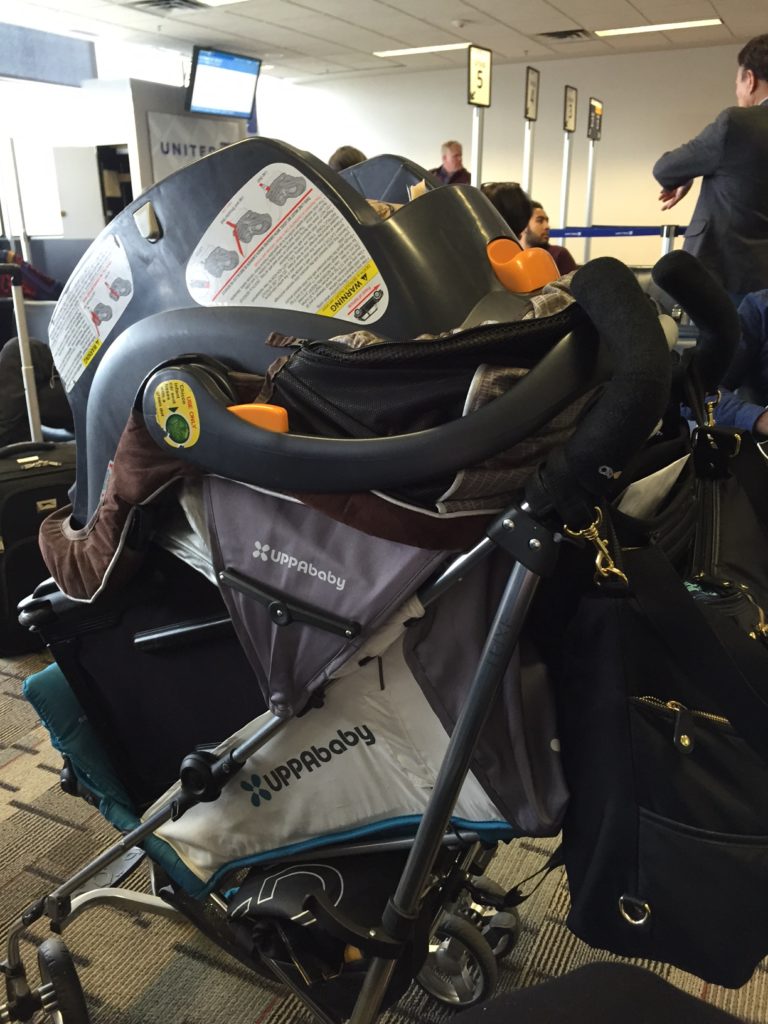
For lots of parents, the most daunting part of figuring out how to travel with a car seat is strategizing about the airport. How to travel with a car seat in the airport depends on your family's specific needs, like how many kids, their ages and what gear you've chosen for flying with car seat and stroller.
Yes, a car seat is another thing to schlep with you on the endless trek through the airport. But it's not the end of the world. Travel systems and other car seat-stroller combinations can help, and there are lots of creative ways you can transport your car seat through the airport all the way to the gate – read about them all here.
Just give yourself plenty of extra time to get through security. Some car seats fit through the x-ray machine, but others will require hand inspection. We've been delayed as much as 10 minutes at security waiting on an officer to poke at our car seats. Beyond that, it's not much of an issue if you have a solid game plan for transporting your car seat around the airport.
Maneuvering through the plane with a car seat can be ugly
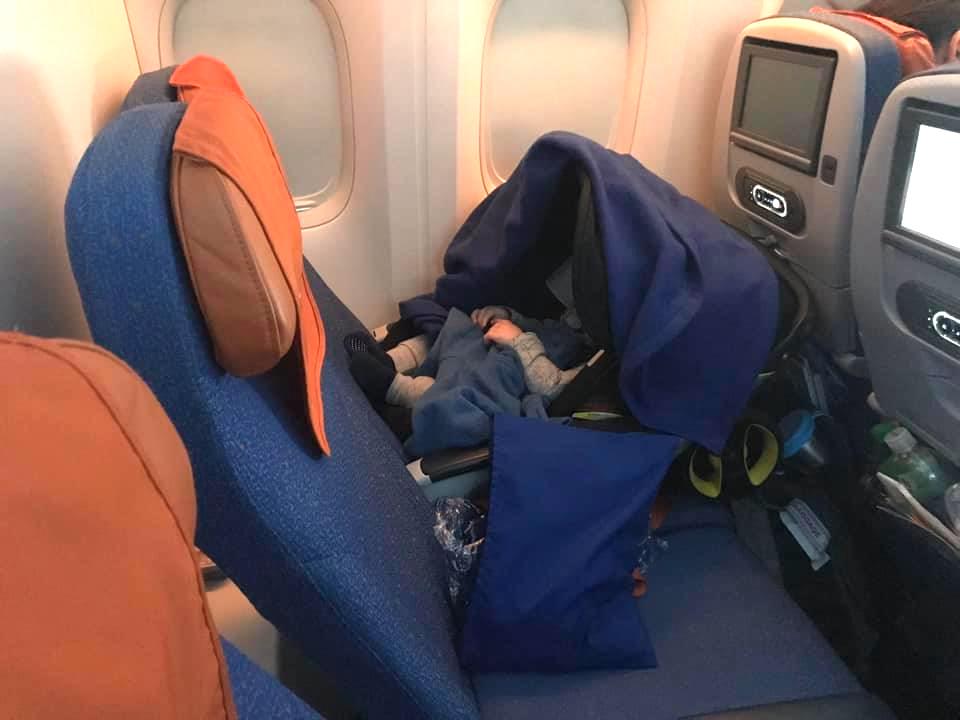
Ok, so getting through the airport is no big deal with the right tricks up your sleeve. Getting through the plane… that can be a little tricky depending on your car seat. Car seats have gotten wider, aisles have gotten narrower. So what can you do?
The first thing to do is show up at the gate with your small child, car seat, carry-ons and miniature circus tent and politely explain that you need some extra time to board the plane and get situated. Usually gate agents will let you on fairly early in the process even if there isn't an official family pre-boarding policy. Trust me, the extra space in every direction can only help you!
There have been plenty of times when I've had to carry a car seat down the aisle of an airplane over my head. That's why I personally prefer a lightweight travel car seat! The other great option is to use a foldable car seat travel cart to wheel your car seat through the aisle. Just make sure the folks in front of you keep their knees in! If you have a Doona, you don't even have to fold the wheels in until you get to your seat.
Once you get to your row, if possible put your child in the same row on the opposite side of the aisle. It's for their own good! Raise the arm rests in your row to make your life easier. If you've used a cart up to this point you need to detach the car seat from the cart, lift the car seat into the row and shimmy it to the window seat if need be. Then fold your cart and stow it under the seat in front of your car seat. If your car seat is light enough that you carried it over the tops of the seats, hopefully you can gently place it in position to begin installing the car seat on the plane.
For me, maneuvering down the airplane aisle was always the worst part of flying with a car seat!
How do you install a carseat on a plane? It's actually pretty easy

Do you remember your first time?
The first time you huffed, puffed, sweated, swore and possibly cried… through installing a car seat, that is.
Installing a car seat on a plane won't be like that. It's generally the easiest kind of installation you can do. There are just a few simple steps for how to install a car seat on a plane:
- Find the correct belt path on your car seat for rear-facing or forward-facing
- Loosen the adjustable side of the airplane seatbelt
- Feed that side through the belt path
- Pray that your hand is tiny enough to reach through
- Buckle the seatbelt
- Put your weight into the car seat (possibly with the airplane seat reclined) while pulling the seatbelt tail to tighten
Here are few tips to help you out…
- An infant car seat is the easiest style to install since the "belt path" is just two little arms that are completely exposed.
- For a rear-facing car seat, the buckle is usually between your child's feet or knees so it won't bother them. As long as your child is on the older side of infancy, it's ok to install your rear-facing convertible car seat a little more upright. Sometimes that's necessary on airlines with tiny seat pitches.
- The biggest challenge with using a forward-facing car seat on an airplane is that the seat belt buckle may end up right in the middle of your child's back. We usually shove a sweatshirt in there after installing the car seat to offer more padding and that's worked well. Some parents also recommend looping the short side of the seatbelt around the armrest so that the latch plate connects outside of the car seat.
- If your car seat has a lock-off for seatbelt installation pretty please read the manual to understand your seat's particulars. The last thing you want to do is break the lock-off on your super expensive car seat!
That's pretty much it when it comes to car seat airplane installation! The best place to look for details on your car seat is in your manual.
You can only be seated in specific places on the plane
Nearly all airlines have rules on where on the plane you can install your child's car seat. Generally speaking, it needs to be in a window seat if it's a single aisle plane, and it can also be in a middle seat in the middle section on a plane with two aisles. We've gotten away with putting a rear-facing car set in the window and a forward-facing car seat in the adjacent middle seat.
A car seat (or a child without a car seat, for that matter) can't be in an exit row. In the US, you usually can't install a car seat in the row in front of or behind the exit row either. Many airlines don't allow car seats in the bulkhead row.
Errrrrr…. So where can you install the car seat?
Rest easy. You can install your child's car seat in the vast majority of seats on any given flight (assuming the airline permits them). We've only run into an issue once in all the flights we've taken, and that was because we were assigned seats immediately behind the exit row.
If you're having trouble figuring out the right seats to request or if you've booked a Basic Economy fare, I suggest reaching out to the airline in a private message on Twitter and let them know you'll be taking a car seat on the plane. It's by far the fastest way to reach a real customer service representative, you'll have everything documented and they can make changes for you immediately if you provide a confirmation number.
Some well-meaning parents worry about inconveniencing other passengers by limiting their recline on long flights. That's awfully nice of you! Remember that your child's safety trumps another passenger's comfort and convenience. That said, you can try to mitigate the issue by putting someone else from your family in front of the car seat – especially if it's rear-facing.
When we traveled with two kids in car seats, we'd book our family of four in the "AB-AB" configuration rather than "ABC-D". The forward-facing car seat went in front of the rear-facing car seat since there was no real need for recline. We missed having the aisle seat but survived lots of flights this way.
Rear-facing car seats are awesome for sleeping babies (and beyond)
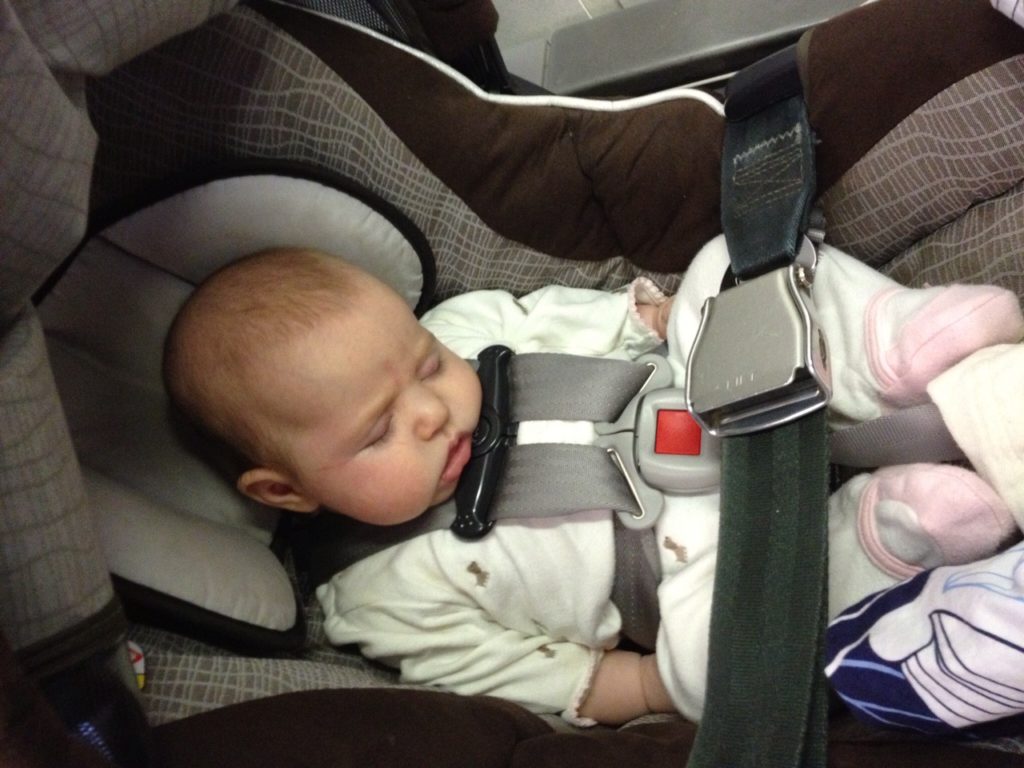
Do you ever have trouble falling asleep on flights because you just can't seem to get comfortable? Imagine if you got to sit in a perfectly-sized, cushioned recliner for the entire flight. That's what I'm talking about.
But seriously, that's what it's like for your baby or young toddler when you put them in a rear-facing car seat on the plane. Their heads are properly supported so they don't loll awkwardly forward. Our flights got much harder when our kids switched to forward-facing because they had a harder time getting comfortable!
The other advantage of rear-facing car seats on planes is that your kids can't really drop stuff. We'd prop the tablet at our kids' feet against the seat back when they were old enough to watch. If they dropped a toy or blankie, it rarely went further than their laps (or ours). These days I feel like half of our flights are spent retrieving their stuff from disgusting airplane floors.
Your kid may not be able to use the tray table (but that might be ok)
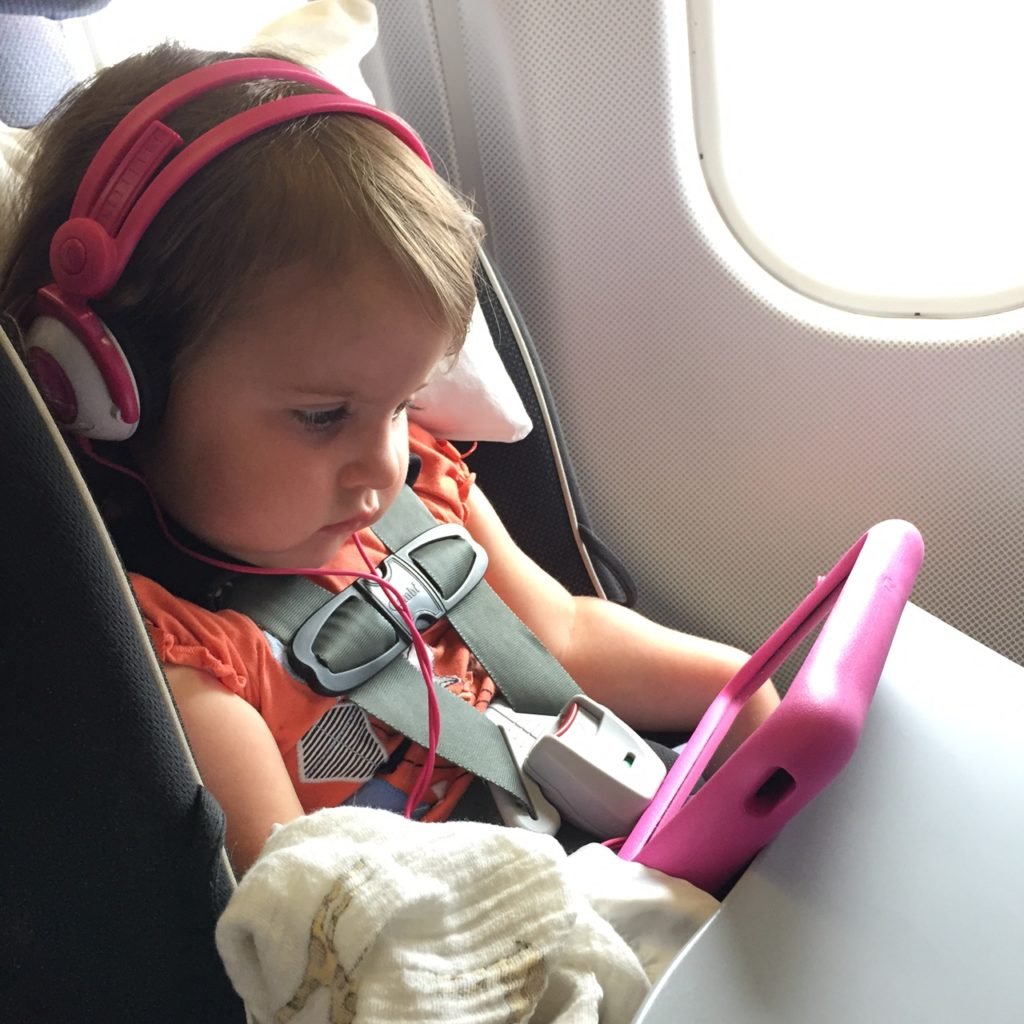
One downside of using a forward-facing car seat on a plane is that, with very few exceptions (this one, this one and this one), a standard tray table won't come down all the way. Boooooo. That can make it hard to serve them meals or offer quiet hands-on activities on a long international flight. One option is to bring along a tray like this one that props on their laps.
Somehow, our kids managed to survive. By the time we let them face the front of the plane, they were much more interested in spending the whole flight watching movies on the in-flight entertainment system… at least as much as we'd let them. And our kids have almost always refused airline meals anyway – just a few nibbles even on 13 hour flights! So we don't stress too much about it. I do recommend bringing a car seat with a cupholder so that your kid can have easy drink access to stay hydrated.
This, however, is the one bright spot of Spirit Airlines and their comically tiny tray tables. They are so ridiculously small that the car seat arm rests don't interfere with them!
You can flip the airplane car seat around mid-flight if you need to
The FAA says you have to use your car seat per manufacturer instructions, but if your child is the right age and size to rear-face or forward-face then it's totally up to what you want to do. Change your mind mid-flight? No problem.
Why might you want to flip your car seat back and forth during the flight? There are a few reasons. On a long flight, you might want to let your child face forward to eat and watch a movie but then flip her rear-facing (which offers more recline) for sleeping. Alternatively, if you have a child who's old enough to face forward but won't stop kicking the seat in front then switching him to rear-facing is the kindest thing you can do for the passenger in front.
When riding in a car, the car seat harness should come from below the shoulders for rear-facing and above the shoulder for forward-facing. I have changed them mid-flight when there was a big difference, but for the cruise portion of the flight I wouldn't worry if they're pretty close to the right spot. For take-off and landing I'd make sure the car seat is installed such that the harness height is correct.
There isn't usually anywhere to store a car seat on board
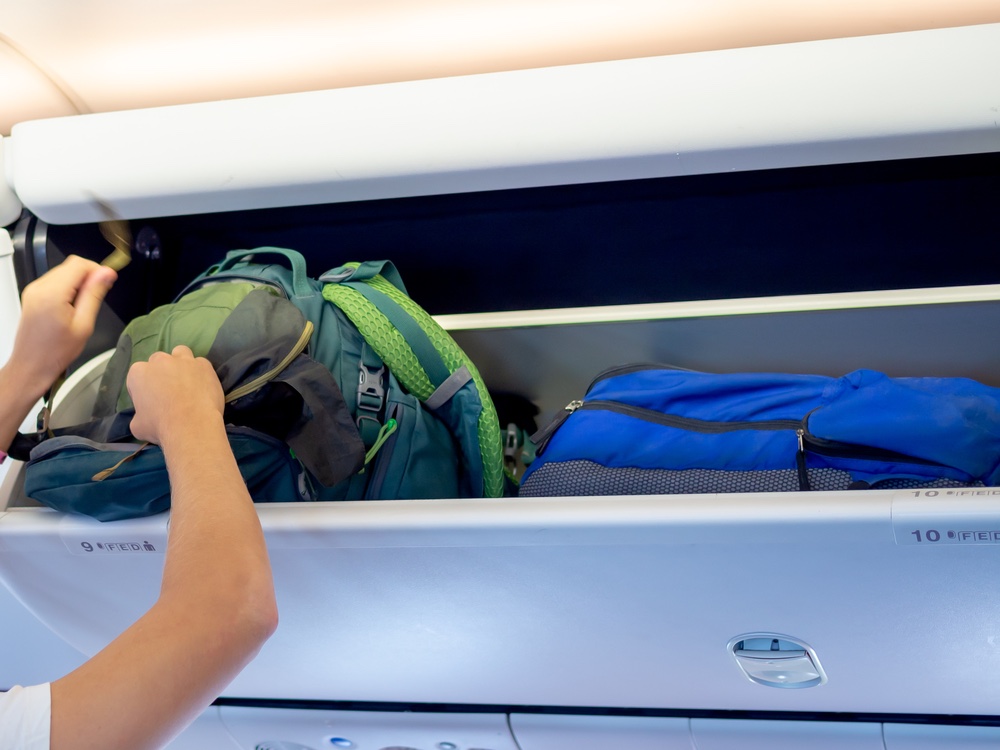
Last but not least… once you decide to bring a car seat on a plane with you, you're pretty much locked in to that decision. Your child will be required to use it for take-off, landing and turbulent patches. In between they don't necessarily have to be strapped in (though that's always the safest bet).
But don't plan on taking your baby out and stowing the car seat elsewhere to let them play. There generally isn't room. There are exceptions, of course – on a huge international flight, the overhead bins (if they aren't full) are usually tall enough to accommodate an infant car seat. Sometimes flight attendants will be nice and put a car seat in a closet in another cabin. But usually either you take it or leave it. If your child is at least 30 lbs and you don't need a car seat at your destination (or you have a Ride Safer travel vest for cars), you can use the CARES harness instead if you think you'll want your child to have the whole seat available to relax and play rather than sitting in the car seat most of the time.
Get a quick visual summary of flying with a car seat!
Flying with car seat FAQs
Does a 2 year old need a car seat on a plane? Do toddlers need car seats on airplanes?
While kids under 2 who have their own seat on a plane are often required to use a car seat, kids over 2 aren't required to use one. However, it's strongly recommended to use a car seat to keep your child safe through runway incidents or extreme turbulence.
Can you bring a car seat on a plane?
If you buy a seat for your child and are flying a US-based carrier, it's your legal right to bring a car seat on board and use it! If you don't buy a seat for your child (under age 2), you may luck out and ask for an empty seat. If you're flying a non-US airline, be sure to check their specific policies before booking your tickets.
Are car seats required on airplanes?
While a car seat isn't generally required on a plane, some airlines do require a car seat if you purchase a ticket for a child under age 2 (assuming he or she is under 40lbs).
Not sure if you do need a car seat on a plane for your upcoming trip? Reach out to the airline to confirm, but remember that the recommendation/requirement is in place to keep your child and the other passengers safe in a runway crash or during serious turbulence.
Pin this for later!
Can Graco Car Seats Be Used on Airplanes
Source: https://travelcarseatmom.com/flying-with-a-car-seat/

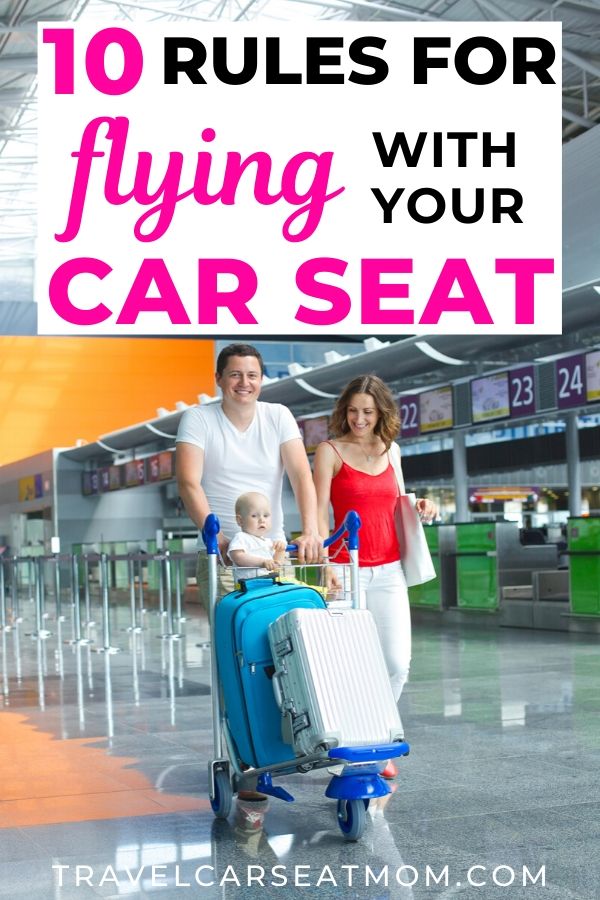
0 Response to "Can Graco Car Seats Be Used on Airplanes"
Post a Comment